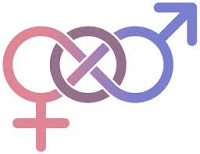 When actress Cynthia Nixon declared that for her, being gay is a choice, she received much negative backlash from the gay and lesbian community.
When actress Cynthia Nixon declared that for her, being gay is a choice, she received much negative backlash from the gay and lesbian community. Most people -- gay and straight alike -- prefer to believe that you are either gay or straight. Bisexuals are seen as "bi now, gay later."
And those who are "heteroflexible" -- heterosexual but enjoying gay sex everyone once in a while -- are almost always seen as latent homosexuals, especially if they are males.
The truth is that it is not this simple at all.
To best understand how complicated this is, we need to be able to differentiate four terms that are often confused: sexual orientation, sexual preference, sexual fantasies, and sexual behavior. Contrary to common usage, they aren't always in alignment.
Sexual orientation encompasses one's sexual and romantic identity, in which thoughts, fantasies, and behaviors work together in concert.
It's the alignment of affectional, romantic, psychological, spiritual, and sexual feelings and desires for those of the same or opposite sex.
Sexual orientation doesn't change over time; it is fixed (although some women experience fluidity in sexual orientation; more on that below).
One's sexual behaviors and preferences might change, but like one's temperament, one's orientation remains mostly stable.
The term also refers to how someone self-identifies, not how others may categorize him or her. Some people self-identify as straight, while others self-identify as gay or lesbian, bisexual, or questioning.
It's important to ask how they self-identify, regardless of whom they have sex with.
Sexual preferences refer to sexual acts, positions, and erotic scenarios that someone prefers and finds erotic to have while engaging in sexual activity.
The term takes into account what individuals like to do and get into sexually, not necessarily with whom they like to do it.
Preferences and erotic interests can change over time, as one becomes more open or closed to certain thoughts and behaviors.
Sexual fantasies are any thoughts that one finds arousing. They can encompass anything -- sexual positions, romantic encounters, body parts, clothing and shoe fetishes, even rape fantasies.
Sexual fantasies aren't necessarily acted out. In fact, in many cases, they aren't. Straight men and women sometimes fantasize about having sex with members of the same sex and even watch porn and find it sexually arousing.
This is similar to lesbians who enjoy watching gay male porn. Lesbians who enjoy gay male porn movies report that it is not about the men in the porn but about the mutual and externalized sexual desire and power balance that exists between them, which is not usually seen in heterosexual erotica.
Sexual behaviors are any behaviors intended to pleasure oneself and/or one's sexual partner. It doesn't necessarily reflect one's orientation.
For example, gay men have sex with women all the time, and it doesn't reflect heterosexuality or bisexuality.
Men who are imprisoned engage in sexual behaviors with other men, but they do so out of sexual necessity, not because of erotic interest in other men.
They desire the sexual release it achieves, and the sex of the partner is secondary.
Men and women are different when it comes to reasons for having sex with the same sex. For straight men having sex with men, same-sex encounters aren't about romance or sexual attraction and desire but about sexual and physiological arousal -- "getting off" with another who's male and accessible.
They don't sexually desire or get aroused by looking at other men, only by the sexual act.
Women in heterosexual porn are not engaging in sex for their own pleasure only; they often are doing it for the pleasure of the straight men watching them, and because they are being paid.
Straight men in gay porn are the second highest-paid actors next to women, giving them a reason to engage in gay sexual behaviors.
But if they don't actively desire other men, how do they get to the point of having sex with them? These men typically want to bond with and get affection from other men.
Their behavior may reflect a desire to experiment, to engage in something that's taboo, or to express inner psychological conflicts involving their sexual feelings and desires that have nothing to do with having a gay or bisexual identity.
Young adults are showing us that they can be sexual with the same sex and the opposite sex while not labeling themselves or each other as the older generations do.
Read the rest



















